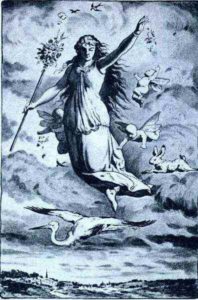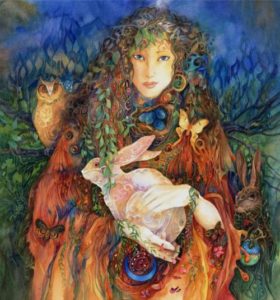Look at this, two blog posts in one day! I couldn’t help it but I wanted to just talk about this whole Eostre hullabaloo while we’re still in Easter mode. I have tried to step away from these kinds of blog posts because I’m not an academic Pagan or someone who gets all excited about doing scholarly writing or research. I do like knowing the history and origins of things if for nothing else than to just know where things come from. When it comes to anything related to spirituality I think the academic stuff can complicate things a great deal, which is what I think happens often with Paganism today. With the meme that’s been floating around Facebook that has been passing on the ridiculous notion that Easter came from the Goddess Ishtar, and that her name is actually pronounced “easter”, it started a whole slew of discussions about the name of Easter, the origins of the holiday, and how Pagan it really is. And since I did make Eostre/Easter connections in my other blog post today I didn’t get into the convoluted and confusing history around it. Well, let’s get into it a little {again keeping in mind that I’m not any kind of academic and I’m just passing on what I know from my own study on the matter}.
 What we know of Eostre is largely modern day myth. There is little to no academic evidence of her existence or worship. The first appearance of Eostre in any academic text happens in the 8th century when a monk and Christian academic, the Venerable Bebe, wrote a text called Temporum Ratione. In it he mentions Eostre as a Goddess honored by the Anglo-Saxons and who the month of April was named after, then called Eostremonth. He briefly talks about a celebration being held in her honor during the spring, but with no details or information to back any of this up.
What we know of Eostre is largely modern day myth. There is little to no academic evidence of her existence or worship. The first appearance of Eostre in any academic text happens in the 8th century when a monk and Christian academic, the Venerable Bebe, wrote a text called Temporum Ratione. In it he mentions Eostre as a Goddess honored by the Anglo-Saxons and who the month of April was named after, then called Eostremonth. He briefly talks about a celebration being held in her honor during the spring, but with no details or information to back any of this up.
Being a Christian it seems a bit unlikely that Bebe completely made Eostre up, which is one of the long held ideas about her appearance in his work. Instead it’s likely that either he discovered some information related to oral Germanic traditions that mention her or, probably most likely, there was a mistranslation somewhere along the way and it was assumed that whatever he found was reference to a deity worshipped by the Germanic tribes. Nobody really knows.
What’s interesting is Eostre then disappears for nearly 1000 years and doesn’t resurface until 1835 when Jacob Grimm, known to most as one of the Grimm Brothers of Grimm Fairytale fame, wrote a book called “Deustche Mythologie”. In his work he talks extensively about Eostre, celebrations in her honor, and makes the associations between her, spring, eggs, and bunnies. He also asserts that her name comes from an Old High German adverb “ostar” which is associated with the direction east. Grimm then goes on to say that Ostara/Eostre means radiant dawn and that she is a bringing of joy and light.
 The problem with all of this, for an academic, is that it’s purely speculation. Grimm lacks any connection to real proof of any kind to back up his material, much like Bebe’s.
The problem with all of this, for an academic, is that it’s purely speculation. Grimm lacks any connection to real proof of any kind to back up his material, much like Bebe’s.
One of the things that modern day Pagan academics often use as a point of contention with Eostre’s existence and worship is the fact that she appears nowhere in the Poetic or Prose Eddas. It’s believed that this is because she wasn’t known or worshipped by the Norse people in Scandinavia and this is where the Eddas originate.
What’s even more interesting are connections to Eostre that are made by two authors of books on Norse deities and worship. Lynda C. Welch, author of “Goddess of the North”, suggests that Ostara/Eastre/Eostre may have been a regional tribal name for Frigga, saying that the two Goddesses seem to share many similar qualities and associations. H.A. Guerber, author of “Myths of the Norsemen from the Eddas and Sagas”, suggest something very similar saying that Eastre/Ostara is the Saxon Goddess of spring who is identical to the Norse Goddess Frigga.
What it all comes down to is what we know of Eostre, what we associate with her, her worship, and her stories, are largely sourced from myth. She’s hardly the first Goddess that we see that with. But she’s one of the only ones that we see getting such widespread attention because of the assertion that she is the basis for a Christian holiday, even if it is in name alone. It seems that as other myths and stories of Eostre grew they all come back to much of the information that Grimm wrote. The problem for some people here is that Grimm’s material is all assumption.
Today most of the material that you’ll find about Eostre/Ostara as a Goddess and the celebration of Ostara are modern neo-Pagan or Wiccan material. This begs the question…Does it matter?
Does the fact that most of what we know of Eostre is, to put it plainly fictional, make her any less important to modern Goddess worship? Do all Gods and Goddess that are honored and worshipped today need to be able to be proven to have lived? Do they all have to have ancient proof of worship? With Paganism being an ever growing and ever evolving spiritual tradition, does it not stand to reason that some of the celebrations and deities honored might have evolved into something we know today that is quite different from what or who they were in ancient times? And what about “found deities”, those that evolved from myth and story without historical merit, like Eostre?
Here’s an even better question…why doesn’t all this debate and discussion come up at Ostara/Spring Equinox?
Eostre is just as much a part of modern Paganism and part of spirit and the Goddess’s energy as any other Goddess. She has had festivals created around her stories, no matter how recent they may be, and for many years she has had energy woven around her name and story through her honor, thus building her divine energy.
Easter certainly isn’t a Pagan holiday, it is a Christian holiday. I do get annoyed with the need for Pagans to always do the “you stole our holiday” dance each time a celebration comes around. Eostre isn’t the reason for Easter, the resurrection of Jesus Christ is. Instead let’s just honor Eostre, our modern Goddess of springtime at the vernal equinox and instead rethink Easter and Resurrection Day in different terms if we wish to honor it {this is what I talked about in my first post today} or let’s just leave it be and let the Christians celebrate their holiday in peace.




I wonder how long people have been honoring Eostre at Spring Equinox? 30 years? 40 years? Is that long enough to have pumped enough energy into the idea to create a goddess out of the magical thought-shaping goo of the universe? Does anyone's sudden disbelief unmake her?
I wonder how long people have been honoring Eostre at Spring Equinox? 30 years? 40 years? Is that long enough to have pumped enough energy into the idea to create a goddess out of the magical thought-shaping goo of the universe? Does anyone's sudden disbelief unmake her?
Well I definitely think we're looking at more than 30 years of worship, but I don't think that the fact that a Goddess or God isn't 1000 years old doesn't make them less important or worthy of worship. I also feel like if the individual finds power in him/her/it and it adds to their spiritual practice and makes them a better person, then that's all that matters. This is what happens when you tred the waters of unorganized spirituality.
On the whole time thing… That's only from a linear perception of time. I also work quantum physics into my practice and figure it's our temporal state that effects our perception of them.
On a more personal note, thank you Jess I've been waiting a long time for what you ended that last sentence with.
On the whole time thing… That's only from a linear perception of time. I also work quantum physics into my practice and figure it's our temporal state that effects our perception of them.
On a more personal note, thank you Jess I've been waiting a long time for what you ended that last sentence with.
I couldn't agree more with the whole linear time idea as well. Time is just our perception…really everything is just a matter of perception. The importance of the historical accuracy of Gods is a matter of perception. Everything is just perception.
When it comes down to it, all gods and goddesses at one time … weren’t. This doesn’t mean they aren’t very real, just that at one time their divinity wasn’t recognized. But whether a god/dess earned their status a million years ago, 50,000 years ago, or 2,000 years ago doesn’t change the validity of their worship of those who believe.
While Easter and Ostara share some traits, they are not the same holiday, and serve different purposes for different people. It is true that many “pagan” elements were incorporated into Christian holidays, and although it has been suggested in various sources that this was done deliberately to make Christianity more palatable to the Pagans, it is just as likely, in my opinion, that the mix was a natural result of changing cultures – much like we see today when people have moved from one country to another and brought their traditions with them.
But in the end, does it really matter if Easter was taken from Ostara? Does it matter if Eostre was originally associated with Ostara or if she was a later addition?
(By the way, I think the connection being made between Ishtar & Easter may come from a couple things: Ishtar is seen as, in one aspect, a Babylonian/Sumerian fertility goddess; and with the various spellings, one might think that “Istar” could be pronounced “easter”…)
I used to be one of those “you stole our holiday” Pagans but I think more what has happened over time {meaning times long past} was that the Pagan traditions were seen not as spiritual but cultural traditions and practices and the “way of the land”, so to speak, and many of those things became part of the way people celebrated the new holiday. I think this may be especially the case with modern Easter…there’s more to Christmas that this and there is certainly some appropriation there, but I think with Easter it’s just cultural trappings being fused on the Christian holiday that grew as people immigrated out of Germany. Since none of what we know of these traditions related to Eostre can be linked back to anything pre-1835 it’s clearly got little if anything to do with the Church trying to make anything palatable for anyone.
More proof supporting my decision to listen to your voice amongst the thousands who purport to be pagan…common sense, tolerance, and a strong personal identity. Thank you Jess.
Faith without common sense is blind faith…and that’s the most dangerous kind there is.
Eostre, I read once, was the Pagen Goddess of Spring and would appear in the form of a Rabbit. Seriously, Pagens have every right to their ‘you stole my holiday’ dance because let’s face it, every single CHRISTIAN holiday IS a RIP OFF of a Pagen tradition. That’s how they got the Pagens to CONVERT! Then to add insult to injury, after taking the Pagen traditions away from them, turned around and started preaching that they were DEVIL WORSHIPPERS!
I do not believe this is what Jesus had in mind when he talked to the masses. I believe he was all about INCLUSION and ACCEPTING of others. “Let He who is without sin be the first to cast the stone!”
btw I am neither Pagen OR Christian. I just think that Christians need to start giving credit where credit is due and be more accepting of where the base of THEIR CHRISTIAN holidays come from!
Hi Mandy,
There is certainly plenty of reason for Pagans to make the “you stole my holiday” claim, but it’s generally one that isn’t entirely 100% accurate. The act of taking a holiday that was already celebrated by Pagans and making it Christian as a way to ease conversion makes sense in the situation/for the time, but it doesn’t mean the holiday itself was “stolen.” At best we can say that many Christian holidays and holiday traditions were “inspired” by the pre-existing Pagan traditions. But regardless, I do agree with you on the point of Christians needed to acknowledge where many of their traditions stem from. And to be fair there are those that do. It’s not Christians so much that the blame should be placed on here but the Church.